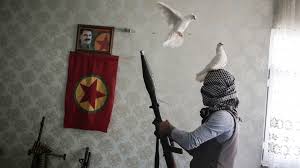“The Kurdish fighters who came to Syria from various parts of the Middle East to support the Syrian Kurdish forces will leave if a ceasefire is reached in the confrontation with Turkey in northern Syria.” This significant statement by Mazloum Abdi, the commander-in-chief of the Syrian Democratic Forces (SDF), confirms the presence of foreign fighters within the SDF’s ranks. Yet, this acknowledgment was hardly revelatory, as it has long been established that the SDF was formed and rebranded to project a more “Syrian” identity. The initiative was orchestrated by PKK leadership in coordination with the United States to establish a Kurdish military force serving multiple strategic purposes, including the fight against ISIS.
Why Now?
The timing of Mazloum Abdi’s statement raises important questions. Why has he made this admission now? Can he truly remove PKK fighters from his military organization? And, crucially, does Turkey view this statement as a constructive gesture or mere rhetoric?
Turkey, for its part, has neither responded officially to Abdi’s remarks nor shown any willingness to engage with them. Instead, Turkish-backed factions have maintained military pressure against the SDF, focusing on reclaiming territories west of the Euphrates. Limited use of Turkish drones in these operations suggests a careful calibration of Turkish-American understandings. However, how long these arrangements will hold remains uncertain.
Abdi’s comments appear to have been made under U.S. pressure, likely aimed at crafting a roadmap for negotiations between the Pentagon and Turkey’s Ministry of Defense. Even the proposal to designate Ayn al-Arab (Kobani) as a demilitarized zone—a suggestion warmly received by Washington—was met with silence in Ankara. Meanwhile, the U.S. has reinforced its presence in the area, establishing a military outpost with clear geostrategic implications.
This unusual move, particularly during a transitional period between U.S. administrations, points to a significant role played by military leaders rather than political decision-makers. President Donald Trump has remained noncommittal about the future of U.S. troops in Syria, further fueling uncertainty about Washington’s long-term strategy in the region.
Security Concerns
Abdi’s acknowledgment of non-Syrian Kurdish fighters within the SDF also raises serious security and legal issues. This admission implies that U.S.-supplied weapons intended for the SDF may have been diverted to PKK fighters, a group designated as a terrorist organization by the U.S. State Department. Such revelations could create legal challenges in Washington while providing Ankara with significant leverage in its negotiations with the incoming Biden administration.
A further question is whether Abdi can effectively disarm these foreign Kurdish fighters—whom Turkey identifies as PKK operatives—and ensure that weapons do not find their way to places like the Qandil Mountains, a critical area for Turkey’s national security.
A Strategic Shift?
Abdi’s statement could also be linked to recent political developments within Turkey. Leaders of the DEM party, which advocates for Kurdish issues, recently held talks with Abdullah Öcalan, the ideological leader of the PKK. Following these discussions, statements emphasized the importance of strengthening Turkish-Kurdish relations under parliamentary frameworks.
Should this mediation succeed, and if Öcalan were to deliver a speech urging PKK fighters to disarm in exchange for a comprehensive political process, it could bolster Abdi’s position. Such a move would provide him with the political leverage necessary to distance the SDF from the PKK and facilitate the removal of PKK fighters from both the SDF and Syrian territories.
This article was translated and edited by The Syrian Observer. The Syrian Observer has not verified the content of this story. Responsibility for the information and views set out in this article lies entirely with the author.


